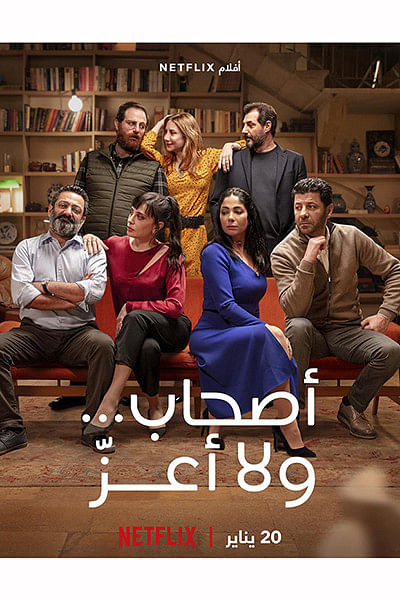1st Arabic Netflix film featuring sex outside marriage, homosexuality stirs debate in region
"Ashab Wala A'azz," which means "No Dearer Friends," becomes the first Arabic movie on streaming platform Netflix, and has sparked a public drama as intense as the one that plays out onscreen, reports Associated Press.

The movie, an Arabic version of the Italian hit "Perfect Strangers," which has inspired many other international remakes, faces a torrent of critics denouncing it as a threat to family and religious values, encouraging homosexuality and unfit for Arab societies.
However, others have rallied to the film's defense, saying detractors are in denial about what happens behind closed doors in real life. Those who don't like the movie, they argue, are free to not subscribe to Netflix or simply skip the film, according to the AP report.
The controversy has re-ignited debates in the region over artistic freedom versus social and religious sensitivities, censorship, and what constitutes a taboo in different societies.
One irony is that Netflix in the Middle East shows many non-Arabic movies and series that feature gay characters in a positive light, premarital and extramarital sex and even nudity -- which is typically banned in cinemas in the region -- with little outcry.
But to see those themes broached in an Arabic-language movie with Arab actors went too far for some. Although the movie has no nudity and is largely an hour and half of people talking around a dinner table.
"I think if it's a normal foreign movie, I will be ok. But because it's an Arabic movie, I didn't accept it," said 37-year-old Elham, an Egyptian who asked for her last name to be withheld due to the sensitivity of the topic.
"We don't accept the idea of homosexuality or intimate relations before marriage in our society, so what happened was a cultural shock."
Homosexuality is a particularly strong taboo in Egypt: A 2013 survey by the Pew Research Center found that 95% in the country say it should be rejected by society; in Lebanon, that number stood at 80% at the time, reports AP.
The movie's cast are mostly prominent Lebanese stars and its events are set in Lebanon, where it has garnered many positive reviews. Fans said it discussed relatable topics away from stereotypes that are usually attached to gay characters or sex outside marriage on screen.
"There's nothing like the Arab world's hatred of the truth," Rabih Farran, a Lebanese journalist, said in a tweet, referring to the backlash.
Talking on a popular TV show, Egyptian lawmaker Mostafa Bakry contended Egyptian and Arab family values are being targeted.
"This is neither art nor creativity," he said. "We must ban Netflix from being in Egypt" even if temporarily.
Magda Maurice, an art critic debating Bakry on the show, disagreed. "This movie exposes what mobile phones do to people and to their normal lives," she said.
"You cannot ban anything now but you can confront it with good art," she added. "Banning has become a thing of the past."
Fatima Kamal, a 43-year-old Egyptian, said she didn't find it to be promoting same-sex relationships. She argued that some Egyptian movies in the past were more daring.
"The movie touched on issues that the society refuses to confront but they do happen," she said. "We all have a dark side and hidden stories."
Kamal, who has a 12-year-old son, also dismissed the idea the film would corrupt Arab youth.
"Technology has changed society. Restricting movies is not the answer," she said. "The solution is to watch based on age ratings and to talk to the young and make them understand that not everything we see on the screen is OK."
In Egypt, much of the furor focused on the sole Egyptian woman in the cast, Mona Zaki, one of the country's biggest stars. In social media, some attacked her for participating in the film, other actors and actresses who supported her or praised her performance, and also her real-life husband, an Egyptian movie star in his own right, for "allowing" her to play the role.
The Egyptian actors syndicate came out in support of Zaki, saying it will not abide verbal abuse or intimidation against actors over their work.
"Our job is to let art be art," film critic Khaled Mahmoud said. "We cannot critique art through a moral lens."
The Associated Press reached out to Netflix for a comment on the controversy but didn't receive one.
Egypt has long celebrated its cinema industry, which earned it the nickname "Hollywood of the East".

 For all latest news, follow The Daily Star's Google News channel.
For all latest news, follow The Daily Star's Google News channel. 



Comments